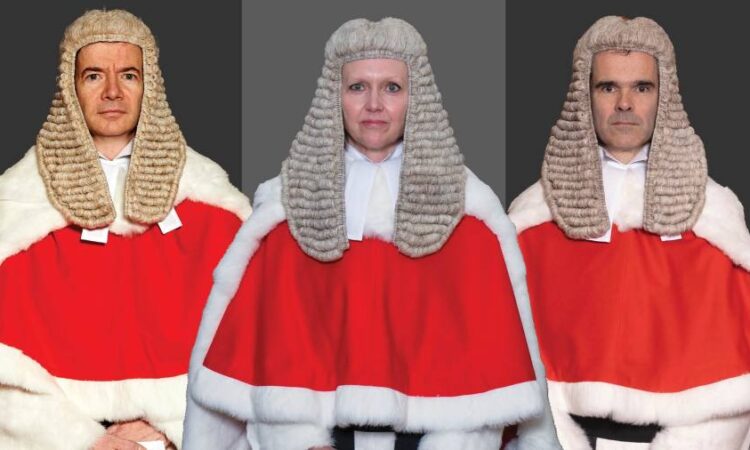
This article is an on-site version of our FirstFT newsletter. Sign up to our Asia, Europe/Africa or Americas edition to get it sent straight to your inbox every weekday morning
At the top of today’s news, three High Court judges invested in controversial tax avoidance schemes that were challenged by HM Revenue & Customs, including one judge who has ruled on tax avoidance cases, raising questions about the UK’s lax approach to disclosure of judicial interests.
The investments by Justices Joanna Smith, Simon Bryan and Martin Griffiths were first made about a decade ago, before their appointments to the High Court, but in the cases of Bryan and Griffiths after they began their judicial careers.
Each has retained their interests in the schemes after taking their positions as High Court judges, Companies House records show.
Two other sitting High Court judges made similar investments in tax schemes that have since closed, one of which was called “highly abusive” and “completely contrived” by a government minister.
The revelations raise questions about the judgment of some of the UK’s top legal minds, as well as the High Court appointment process and the absence of rules requiring UK judges to make formal disclosures about their financial affairs, either publicly or privately.
Here’s what else I’m keeping tabs on today:
-
Economic data: The EU publishes flash first-quarter gross domestic product and employment figures, while the UK has its monthly labour market report and the Zew Economic Sentiment survey is due in Germany.
-
European Central Bank: ECB supervisory board member Anneli Tuominen and Dominique Laboureix, chair of the Single Resolution Board, speak at the Iese Business School’s Madrid campus.
-
Cannes: The 76th iteration of the internationally renowned film festival begins in the south of France.
-
Results: Boohoo.com, Bouygues, Britvic, Imperial Brands, Land Securities, Marston’s and Vodafone report.
Five more top stories

1. The UK’s policing minister has pushed for increased use of facial recognition technology by law enforcement across the country. Any such move by Chris Philp, who was appointed minister of state for crime, policing and fire last October, is likely to be divisive, as critics argue the technology is inaccurate and some of its applications illegal.
2. Ford plans to scale back future investments in China, with the company’s chief executive telling the Financial Times there was “no guarantee” western carmakers could win against local electric-vehicle rivals. Ford will instead use the market to help it better understand battery technology. Read more from Jim Farley’s interview with the FT.
3. The EU should crack down on India reselling Russian oil as refined fuels including diesel into Europe, the bloc’s high representative for foreign policy said. Josep Borrell told the FT that Brussels was aware that Indian refiners were buying large volumes of Russian crude oil before processing it into fuels for sale in Europe.
4. Norway’s $1.4tn oil fund will step up its use of shareholder proposals to send messages on environmental, social and governance topics to US companies. The world’s largest sovereign wealth fund filed shareholder proposals on climate for the first time this year at four US companies and said it considered the trial a success.
5. Record levels of share buybacks are attracting complaints from prominent investors concerned that the practice is boosting executive bonuses but providing only limited benefits to shareholders. The world’s 1,200 biggest public companies collectively bought back a record $1.3tn of their own shares last year, triple the level of a decade ago.
News in-depth

As Europe’s central bank pushes ahead with the development of an electronic currency, conspiracy theories are swirling, with some fearing the state will use it to track and control citizens’ spending. While many politicians hope a digital euro can be launched in as little as three years’ time, they are struggling to communicate convincing arguments for the project, with opponents arguing it is a solution seeking a problem.
We’re also reading . . .
Don’t miss this episode of the FT Talent podcast to hear chief economist Martin Wolf discuss how he built his career.
Chart of the day

This year the platinum market is expected to chalk up its largest deficit since records began in the 1970s as supply falters in South Africa and China’s industrial expansion powers ahead. The deficit marks a stark reversal from bumper oversupply in the previous two years when car production was hit by semiconductor shortages.
Take a break from the news

Since lockdown and “The Great Slobification”, the sartorial blurring of home and work has continued, further boosted by the broader casualisation of office-wear. If you have a “nostalgic hankering for a bifurcated wardrobe”, you are not alone, writes Emma Jacobs.
Additional contributions by Emily Goldberg
Thank you for reading and remember you can add FirstFT to myFT. You can also elect to receive a FirstFT push notification every morning on the app. Send your recommendations and feedback to [email protected]



